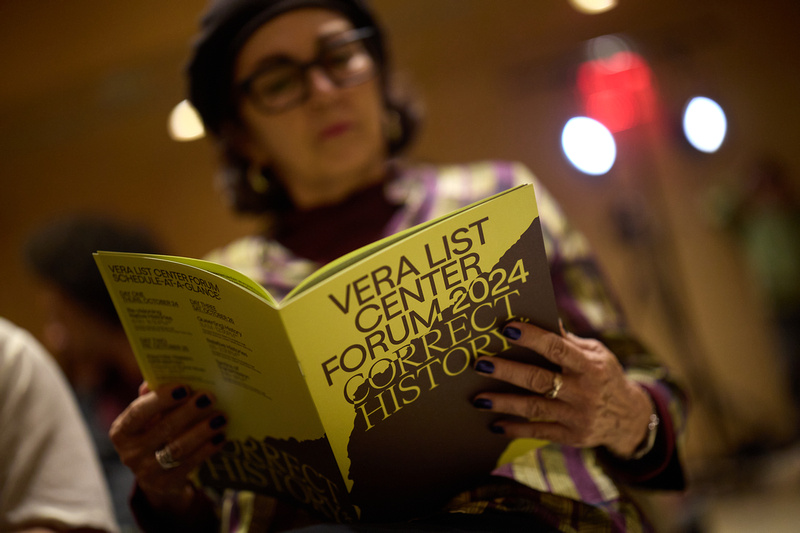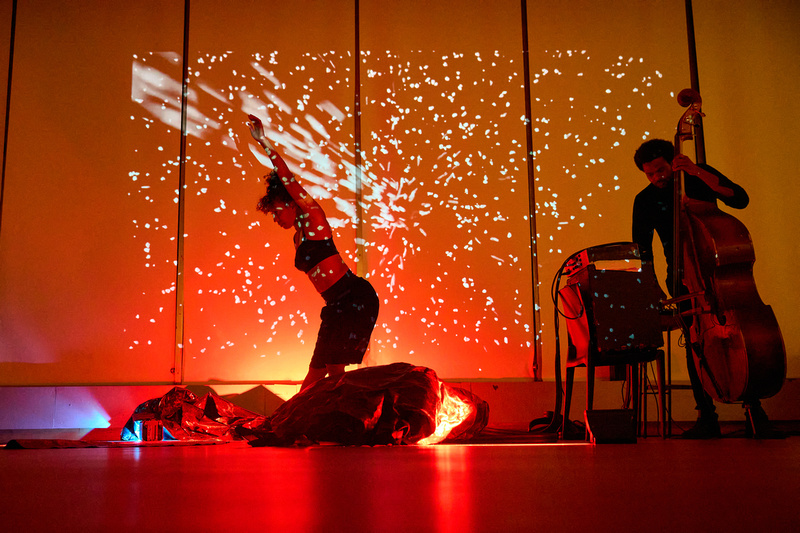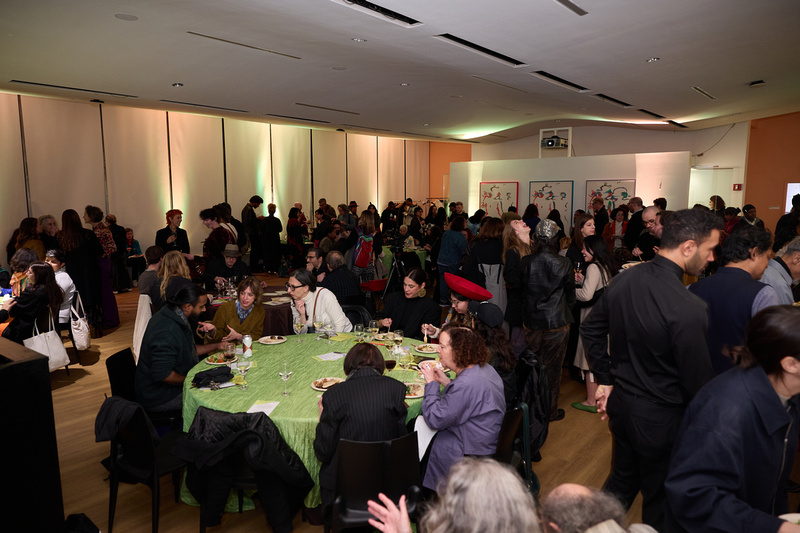
The Vera List Center for Art and Politics Explores “Correct History*” in 2024 Forum Topic
A performance lecture about the Puerto Rican collections held at the Smithsonian Institute. A Community Dinner featuring a collaboration between a performance artist and a Jazz composer about the ways in which history and technology have defined our understanding of the present A conversation that explores the foundational narratives of the so-called United States and centers Indigenous figures, events, and experiences in its re-telling.
All these events, and more, were part of the Vera List Center for Art and Politics 2024 Forum entitled Correct History*. Forum participants delved into how history and historiography inherently involve processes of correction and revision while also uncovering the ideological forces that shape them. Over three days, students, artists, and the broader public questioned how historical accounts are constructed, revised, and contested—including through historical revisionism, whitewashing, and rehabilitation by state and other hegemonic political actors—spanning regions from Turtle Island to Latin America, Bangladesh, and beyond.
The VLC Forum 2024 is presented as part of the center’s 2022–2024 Focus Theme Correction*, concluding over two years of programming around the metaphorical, political, and social dimensions and implications of correction.
“You’d think we would have exhausted correction as a topic of inquiry after two years, but we’ve found that with the VLC Focus Themes—generous and generative as they are—we often feel like we’ve barely scratched the surface,” explains Eriola Pira, Curator and Director of Programs at the VLC and lead curator for this year’s Forum. “So, while we wanted to explore new territory, we knew we had to dig deeper, and under the heading of Correct History*, we could do both. The title thus references both the notion of correct or just history, which has gained ever more currency and urgency as we’ve tried to reckon with the legacies of imperial and colonial violence, and questions the very premise of accurate or singular history. The asterisk, as in the VLC Focus Theme Correction*, which held space for future annotations and pointed at correction’s ongoing process of change and adjustment, points to history’s same perpetual state of being revisited and revised.”
Building on previous Correction* programs and the center’s ongoing commitment to questions of rematriation, return, and restitution, primarily from Indigenous perspectives, the Forum included artists, researchers, scholars, and others who have long been in the VLC orbit, such as Andrea Geyer, a former VLC Fellow and Parsons faculty member, alongside artistic practices and critical perspectives. Together, they offered not only enriched approaches to understanding correction and correct history but also innovative ways of presenting these ideas to the public.
“With this Forum, we aimed to balance the discursive and performative, both discussing and enacting the ideas,” says Pira. “This is driven by a desire to present new, ambitious live art by artists, as we do with every Forum while emphasizing that creating and interpreting history are dynamic, ongoing processes. The work of amending, repairing, and correcting the historical record demands both deep reflection and active engagement, and each contribution and presentation embodied this duality brilliantly.”


Selfless Abandon (Miriam Parker and New School faculty member Luke Stewart) performing Channeling (left) at the Vera List Center Forum 2024: Correct History* Community Dinner (right). October 25, 2024. Photo by Argenis Apolinario, courtesy the Vera List Center for Art and Politics.
Every aspect of Correct History* was designed to strike that balance, whether it was the Forum’s publication, which includes a photo essay by Armenian artist Hande Sever, whose research highlights how visual culture is used to construct and occlude historical narratives, or the meal served at the Community Dinner, which consisted of Palestinian cuisine that was meant to get attendees to think about and experience how food, music, and art are both means for erasing a people’s history while also communal acts of resilience and resistance in safeguarding histories, shared rituals, and more.
“Hopefully, as we gathered just days before a historic election, the VLC Forum was an opportunity to affirm community,” shares Pira. “As historical and ongoing genocides continue to be denied, even while they’re unfolding on our screens, the Forum was also a reminder about the role artists, scholars, and all of us really can play in how this moment will be remembered, talked about, and be historicized in the future.”
Pira hopes that Forum attendees and participants were reminded of the transformative power of artistic intervention and imagination in constructing and resisting oppressive, revisionist narratives of history.
“By positioning the intersection of art and politics as a crucial space for developing new modes of civic engagement, the Forum highlights the power of creative practices to question dominant ideologies, spark critical dialogue, and pave the way for innovative approaches to collective action and resistance to the rise of authoritarian power,” explains Pira.
In his opening remarks at the VLC Forum, President Joel Towers described it as “a focal point for the university. As an important moment to reflect on the status of art that addresses political subject matter, it epitomizes The New School’s commitment to creative practices that positively impact their communities far beyond the university.”
Looking ahead, the VLC is currently presenting A Non-Coincidental Mirror, a film installation by Carmen Amengual, a 2022–2024 VLC Fellow. The film installation focuses on a little-explored event in the cultural history of the Global South solidarities and is being co-presented with Smack Mellon in Dumbo. The VLC will also publish its latest book, As for Protocols, in March 2025, which comes out of its 2020–2022 Focus Theme of the same name and examines protocols as systems of language and practice. Contributors to the book include New School professors such as Pablo Helguera, Professor of Arts Management and Entrepreneurship in the College of Performing Arts, Romy Opperman, NSSR Professor of Philosophy of Race and Climate Change, Robert Sember, Eugene Lang faculty member, and many more.